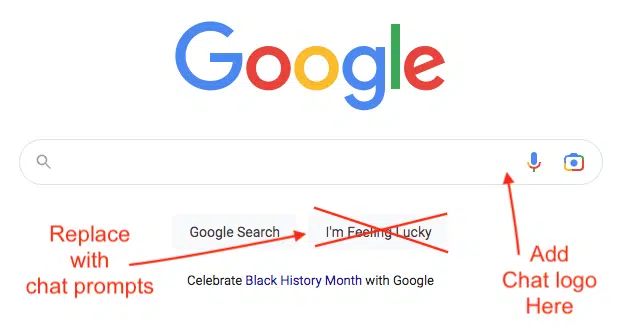Google testing new search design with AI answers over organic results
We may have gotten our first preview of at what chatbot-style Google desktop search results will look like later this year
Google has reportedly started testing a new desktop search page design that integrates chat technology.
We already knew Google wants to add chatbot features to search this year. A new CNBC report provides more details on what the experimental search page may look like.
Google’s alternate search page. In one version of Google’s search results, the company replaced the iconic I’m Feeling Lucky button under the search bar with five prompts for potential questions. There was also a small chat logo” inside the far right end of the search bar, according to the report.
Based on this description, here’s a fairly terrible rendering of what that would look like:

Google’s alternate SERP. It sounds like this would push Google’s organic search results much further down the page. As CNBC explained:
When a question is entered, the search results show a gray bubble directly under the search bar, offering more human-like responses than typical search results. Directly beneath that, the page suggests several follow-up questions related to the first one. Under that, it shows typical search results, including links and headlines.
Now I haven’t seen this experimental design.
However, based on how this was described, it may look similar to certain SERPs where there is a featured snippet followed by People also ask, then organic results. For example, [what is cheese made of]:

So you could imagine the “gray bubble” in place of the featured snippet explaining how cheese is made (with an answer generated by Google AI instead of awarded to the source of the featured snippet here), and the “follow-up questions” replacing PAA.
Why we care. Could this be what chatbot-style Google desktop search results will look like later this year? While it’s not a radical departure from the current Google desktop design, this would mean that visibility for websites – and perhaps traffic – will be impacted. If you thought Google was stealing your traffic and clicks before, well… it’s safe to say there will be many angry search marketers.
What Google is saying. According to a Google spokesperson:
- “We have long been focused on developing and deploying AI to improve people’s lives. We believe that AI is foundational and transformative technology that is incredibly useful for individuals, businesses and communities, and as our AI Principles outline, we need to consider the broader societal impacts these innovations can have. We continue to test our AI technology internally to make sure it’s helpful and safe, and we look forward to sharing more experiences externally soon.”
Dig deeper. Jennifer Elias on CNBC (Google is asking employees to test potential ChatGPT competitors, including a chatbot called ‘Apprentice Bard’) also reports on how Google is also testing out its version of ChatGPT, which uses its LaMDA technology that includes answers based on recent events (which is is something ChatGPT can’t do at this time).
Related stories